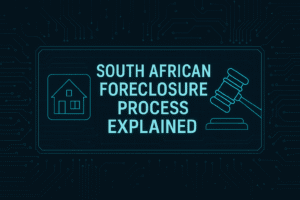Unlock Your Home’s Hidden Wealth: Property Equity Explained for SA Homeowners
Property Equity Explained for SA Homeowners: What if I told you that sitting right under your roof, potentially untapped, lies a significant financial resource – possibly hundreds of thousands, even millions, of Rands? It sounds almost too good to be true, especially amidst rising living costs and economic uncertainty in South Africa. Yet, for millions of SA homeowners, this isn’t a fantasy; it’s the reality of property equity.
Think about Sarah from Johannesburg. She diligently paid her bond for 15 years, watching her neighbourhood flourish. Her house felt like home, a place of security, but also sometimes like a beautiful cage. She felt ‘house rich’ but ‘cash poor,’ struggling with unexpected expenses and dreaming of renovating her dated kitchen. She knew her property value had increased significantly, but that wealth felt locked away, inaccessible. The term “equity” floated around, but it felt like complex financial jargon, intimidating and out of reach. Sarah’s story isn’t unique. Many South African homeowners feel the same – proud owners, yet financially constrained, unaware of the powerful tool they possess. But what if understanding this one concept could change everything?
Feeling Stuck? The Common Pains of SA Homeowners
Owning a home in South Africa is a significant achievement, often the culmination of years of hard work and saving. It’s your sanctuary, your investment, your piece of the Mzansi dream. But let’s be honest, it also comes with its own set of pressures:
- The Relentless Bond Payment: Month after month, that debit order goes off, a constant reminder of the long-term financial commitment.
- Rising Costs Everywhere: From petrol to groceries to electricity, the cost of living seems to climb relentlessly, squeezing household budgets tighter and tighter.
- Unexpected Life Events: Medical emergencies, school fees increasing faster than salaries, urgent home repairs – life throws curveballs that demand funds you might not readily have.
- Deferred Dreams: That renovation project, starting a small business, funding your child’s tertiary education, or even just building a comfortable emergency fund – these often feel perpetually out of reach.
- Financial Jargon Overload: Terms like “equity,” “access bond,” “further advance,” “second mortgage” can sound confusing and overwhelming, making you hesitant to explore options. You worry about making a mistake, adding more debt, or jeopardizing your home.
This feeling of being financially stretched, despite owning a valuable asset, is incredibly common. You might feel trapped, unable to leverage the very thing you’ve worked so hard to acquire. The good news? Understanding property equity is the first, crucial step towards alleviating these pressures and gaining control.
Demystifying Your Hidden Asset: What Exactly IS Property Equity? (Jab 1)
Let’s break it down simply. Property equity is the difference between the current market value of your home and the outstanding amount you still owe on your bond (and any other loans secured against the property).
Formula: Market Value of Your Home – Outstanding Bond Balance = Your Equity
Example:
- Your home is currently valued at R2,500,000.
- You still owe R1,000,000 on your bond.
- Your property equity is R1,500,000 (R2.5m – R1.0m).
This R1.5 million represents your actual stake in the property – the portion you truly “own” financially.
How Does Equity Grow?
Your equity isn’t static; it typically grows over time through two main mechanisms:
- Bond Repayments: Every month, a portion of your bond payment goes towards reducing the principal amount you owe. As the outstanding loan balance decreases, your equity increases.
- Property Value Appreciation: The South African property market, despite fluctuations, has shown long-term growth trends. As the market value of your home increases (due to location, demand, improvements, inflation), your equity grows, assuming your loan balance isn’t increasing proportionally. Keeping an eye on property price trends is key – resources like the FNB Property Barometer (or similar reports from major banks or property data providers like Lightstone) can offer valuable insights into market movements.
Understanding this growth is empowering. It transforms your home from just a place to live into a dynamic financial asset that’s actively working for you.
Client Success Story 1: Clarity Brings Peace of Mind
“We’d owned our home in Durban North for 10 years,” shares Thabo M. “We knew the value had gone up, but we were clueless about ‘equity’. We felt anxious about future costs like university fees. We contacted Real Estate Assist Solutions just to understand our position. They clearly explained how our equity had grown significantly through payments and market appreciation. Just knowing the actual figure, understanding what it represented, lifted a huge weight. We haven’t accessed it yet, but having that knowledge, that clarity about our financial standing, has given us incredible peace of mind. We now see our home not just as an expense, but as a real safety net.”
Thabo’s experience highlights a crucial point: knowledge is power. Simply understanding your equity position can drastically change your financial perspective.
Beyond Understanding: Putting Your Equity to Work (Jab 2)
Okay, so you understand what equity is and how it grows. The next logical question is: What can you actually *do* with it? This is where your home equity transforms from a number on paper into a potentially life-changing tool. Accessing your equity essentially means borrowing against the value you’ve built up in your home.
Here are some common ways South African homeowners leverage their equity:
- Home Renovations & Improvements: Increase your home’s value and enjoyment. A modern kitchen, an extra bathroom, or improved security can be funded through equity, often adding more value than the cost of the project.
- Debt Consolidation: Consolidate high-interest debt (like credit cards, personal loans) into a single, potentially lower-interest loan secured against your property. This can simplify payments and save you money on interest charges. Caution: This requires discipline, as you’re converting unsecured debt into secured debt.
- Education Funding: Cover the rising costs of tertiary education for yourself or your children without draining savings or taking out expensive student loans.
- Investment Opportunities: Use equity to fund other investments, such as a deposit on a rental property or starting a business. This carries higher risk and requires careful financial planning.
- Major Life Expenses: Fund significant events like a wedding or travel, though careful consideration of borrowing for non-appreciating assets is crucial.
- Emergency Fund: Accessing a portion of equity via a flexible facility (like an access bond feature or line of credit) can provide a safety net for unexpected crises.
How Can You Access Equity? Common Methods in SA:
Several mechanisms exist, often facilitated by the bank holding your primary bond:
- Further Advance/Re-advance: If you’ve paid down a portion of your original bond, you might be able to re-borrow those funds (re-advance) or borrow additional funds against your increased equity (further advance) under your existing bond agreement.
- Access Bond Facility: Many modern home loans in SA have an ‘access bond’ feature. This allows you to withdraw any funds you’ve paid *over and above* your minimum required monthly payments. It offers flexibility but only allows access to pre-paid amounts, not necessarily the full equity growth from market appreciation.
- Second Bond (or Mortgage): Taking out a completely separate, new loan secured against the equity in your property. This might be from a different lender and could have different terms and interest rates.
- Home Equity Loan / Line of Credit: While less common as distinct products in SA compared to some countries, the principles often overlap with further advances or second bonds. A loan provides a lump sum, while a line of credit offers a revolving credit facility you can draw on as needed, up to a certain limit.
Important Consideration: Accessing equity means increasing your debt. It’s crucial to understand the terms, interest rates, repayment implications, and associated fees. It’s not “free money”; it’s borrowing against your asset.
The Real Estate Assist Solutions Approach: Strategic Guidance, Not Just Access
This is where navigating the options can become complex. Which method is best? How much equity should you access? What are the risks? This is precisely where Real Estate Assist Solutions offers a unique approach.
We believe that accessing equity shouldn’t be a rushed decision driven by immediate need alone. It should be a *strategic* financial move aligned with your long-term goals. Our focus isn’t just on helping you unlock funds; it’s on empowering you with:
- Personalized Equity Assessment: We help you accurately understand your current equity position and potential borrowing capacity.
- Goal-Oriented Planning: We discuss *why* you’re considering accessing equity and help evaluate if it’s the right tool for your specific objective (e.g., comparing it to other financing options).
- Risk Awareness: We ensure you understand the implications – increased debt, potential impact on future borrowing, the security against your home.
- Navigating Lender Options: We provide insights into the different products offered by banks and help you understand the nuances. (Perhaps link to a ‘Comparing Equity Access Options’ page here: Learn More About Your Options)
- Informed Decision-Making: Our ultimate goal is to equip you with the knowledge and clarity to make a confident decision that benefits your financial health, both now and in the future. We help you avoid common pitfalls and leverage your equity wisely. (Perhaps link to a ‘Wise Equity Usage Guide’ here: Read Our Guide to Smart Equity Use)
Client Success Story 2: Strategic Use for Future Growth
“My wife and I wanted to add a flatlet to our Cape Town property for rental income,” says David P. “We knew we had equity but were overwhelmed by the ‘further advance’ vs ‘second bond’ debate. The bank’s explanation was confusing. Real Estate Assist Solutions sat down with us, analyzed our situation, and clearly outlined the pros and cons of each option based on our goal of maximizing rental return while minimizing long-term interest costs. They helped us structure the application for a further advance, which turned out to be the most cost-effective route. The flatlet is now built, generating income, and significantly increasing our property value. Their guidance was invaluable; we wouldn’t have navigated it so smoothly or strategically on our own.”
Your Home is More Than Bricks and Mortar – It’s Potential
Your South African home is likely your most significant asset. Understanding and potentially leveraging the equity within it can be a powerful catalyst for achieving your financial goals, improving your quality of life, and building long-term wealth. However, navigating this landscape requires careful consideration and informed choices.
Don’t let confusion or uncertainty hold you back from exploring the potential hidden within your property. Knowledge transforms anxiety into empowerment. Taking the time to understand your equity and the options available is the first step towards unlocking significant financial flexibility.
Ready to gain clarity on your property equity and explore how it could work for you?
Take the first step towards unlocking your home’s potential. Contact Real Estate Assist Solutions today for a personalized, no-obligation consultation to understand your equity position and discuss your options strategically. Click Here to Schedule Your Consultation



